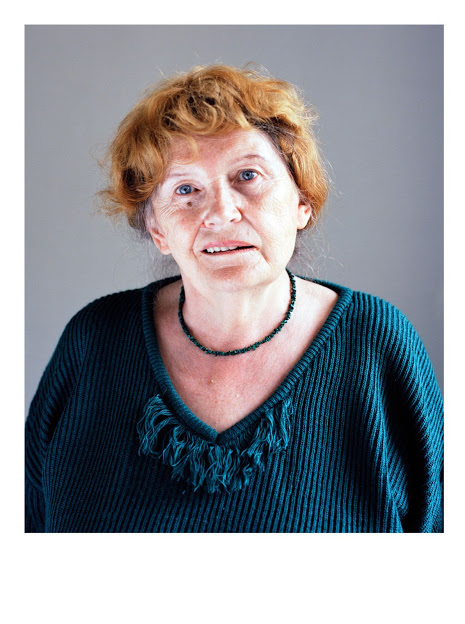Krystyna Usarek
May 1924 - September 12, 2008
Lawyer, radio journalist
Ravenbrück: 5./6. August 1944, from March 1945 forced labor in Stuttgart
Her guideline was: "Nobody will ever be able to force me to say what I don't think."

Krystyna Usarek im Jahr 2004, Foto: W. Reiher
Krystyna Usarek was born in May of 1924 into the family of a teacher couple.
After the Germans invaded Poland in 1939, they closed all educational institutions with the exception of primary schools. Polish youth were not suppose to have higher education.
Krystyna, then 15 years old, graduated from an illegally working school. She then began studying law at Warsaw University. Just like the school lessons before, the lectures and seminars took place in the teachers' private apartments. Krystyna's parents both actively participated in the resistance against the planned annihilation of the Polish intelligentsia.
The Gestapo arrested the parents and Krystyna as well as the entire family on July 30, 1944 and held them in the Warsaw prison Pawiak. At that time, Krystyna did not know about the exact political activities of her parents.
From Pawiak, Krystyna was deported to the Ravensbrück concentration camp together with her mother Stefania and her aunt. Her father was sent to the Stutthof concentration camp.
In Ravensbrück, Krystyna managed to get a job in the political department of the administration, although she spoke almost no German at the time. Due to her beautiful handwriting, which caught the attention of the responsible SS personnel, her white lie about mastering the German language went undetected. Their job was to register the arriving prisoners.
In March 1945 she was sent to Stuttgart for forced labor in the Hotel Graf Zeppelin, where she was liberated in an air raid shelter.
After returning to Warsaw, Krystyna Usarek finished her law studies. While still a student she started working as an announcer for the Polish radio. Over the years she became a very well-known radio journalist who was admired by many and feared by some for her analytical sharpness and critical openness.
Krystyna Usarek was convinced that Ravensbrück had shaped her for life, personally and politically. The most important goods to her that should be achieved and preserved in life, are justice and love. She actively brought her communist convictions into party work. And in many journalistic works she portrayed people from a wide variety of backgrounds with heart and respect. For this she received one of the highest state awards.
Her guideline was: "Nobody will ever be able to force me to say what I don't think."
In her speech in Ravensbrück on the occasion of the 59th anniversary of the liberation, she said the following:
“We hope that a united Europe will eliminate the old wars and violence. You, who are present here today, have to fight to ensure that the name German does not mean executioner, but a peaceful person ... We former prisoners of the Hell of Ravensbrück, the living and the dead, have confidence in you. In this struggle, the German people must have their share. So it is your job ”, she warned those present to the unabated fight against inhumanity and war.
Krystyna Usarek wrote a book called “Grób Agrypiny” (The Grave of Agrippina), for which she had to get used to a computer in old age. Designed as a detective novel, it portrays people from the history of Poland in the 20th century. Ravensbrück also plays an important role in this, especially the story of the young Polish women who were used by SS doctors as so-called guinea pigs for medical experiments and who suffered terrible agony. The book was published in 2001.
Krystyna understood many languages and spoke excellent German, English, French and Italian herself. She gave birth to a daughter.
In addition to her commitment as a member of the International Ravensbrück Committee, she was associated with the Action Reconciliation for Peace Services for many years.
- Source: Text by Hanna Nowakowska, Warsaw, 2020 and Constanze Jaiser, Jacob David Pampuch (eds.); Europe in struggle 1939-1944; Metropol Publishing House, 2005; Pp. 207-209 *
Credentials: Kiedrzynska W., Ravensbrück - Kobiecy obóz koncentracyjny. Warszawa 1965 List of Ravensbrück prisoners: http://www.stankiewicze.com/ravensbruck/ravensbruck_3.htm Interview of Anna Sekudewicz with Janina Jankowska reporter in Polish radio, colleague of Krystina Usarek (talk in Polish) http://www.sdp.pl/wywiady/5106,rozmova-dnia-12-lutego,1307050285 “Piekna z zasadami2 - reportaz Olgi Mickiewicz (in Polish), http://www.polskieradio.pl/80/1007/Artykul/1478089,Piekna-z-zasadami-reportaz-Olgi-Mickiewicz http://www.nekrologi-baza.pl/zlista/417